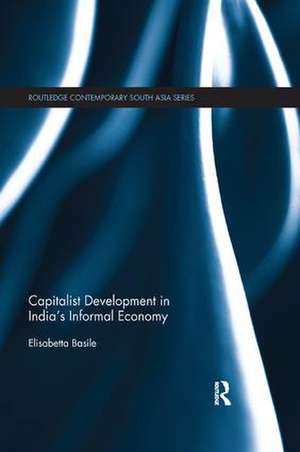Capitalist Development in India's Informal Economy: Routledge Contemporary South Asia Series
Autor Elisabetta Basileen Limba Engleză Paperback – 12 oct 2017
Focusing on the processes of growth induced by the introduction of the high-yield varieties in agriculture, the book demonstrates that a low-road pattern of capitalist development has been emerging in provincial India: firms compete over price and not over efficiency, with a constant pressure to reduce costs, in particular labour costs. The book shows that low-skilled employment prevails and low wages and poor working conditions are widespread.
Based on original empirical research, the book makes a valuable contribution to the debate on varieties of capitalism, in particular of the Global South. It is of interest to academics working in the fields of Development Studies, Political Economy and South Asian Studies.
| Toate formatele și edițiile | Preț | Express |
|---|---|---|
| Paperback (1) | 190.88 lei 6-8 săpt. | |
| Taylor & Francis – 12 oct 2017 | 190.88 lei 6-8 săpt. | |
| Hardback (1) | 544.50 lei 6-8 săpt. | |
| Taylor & Francis – 25 apr 2013 | 544.50 lei 6-8 săpt. |
Din seria Routledge Contemporary South Asia Series
-
 Preț: 386.31 lei
Preț: 386.31 lei -
 Preț: 309.12 lei
Preț: 309.12 lei -
 Preț: 341.55 lei
Preț: 341.55 lei -
 Preț: 313.81 lei
Preț: 313.81 lei -
 Preț: 296.64 lei
Preț: 296.64 lei - 8%
 Preț: 389.83 lei
Preț: 389.83 lei -
 Preț: 310.08 lei
Preț: 310.08 lei -
 Preț: 200.66 lei
Preț: 200.66 lei - 9%
 Preț: 1001.47 lei
Preț: 1001.47 lei - 18%
 Preț: 1056.00 lei
Preț: 1056.00 lei - 18%
 Preț: 1068.52 lei
Preț: 1068.52 lei - 18%
 Preț: 1060.87 lei
Preț: 1060.87 lei - 18%
 Preț: 1060.87 lei
Preț: 1060.87 lei - 18%
 Preț: 1060.52 lei
Preț: 1060.52 lei - 26%
 Preț: 848.40 lei
Preț: 848.40 lei - 18%
 Preț: 1059.48 lei
Preț: 1059.48 lei - 18%
 Preț: 1061.93 lei
Preț: 1061.93 lei - 18%
 Preț: 1057.05 lei
Preț: 1057.05 lei - 18%
 Preț: 1062.98 lei
Preț: 1062.98 lei - 18%
 Preț: 1054.97 lei
Preț: 1054.97 lei - 18%
 Preț: 1058.79 lei
Preț: 1058.79 lei - 18%
 Preț: 1057.09 lei
Preț: 1057.09 lei - 18%
 Preț: 705.87 lei
Preț: 705.87 lei - 18%
 Preț: 1054.97 lei
Preț: 1054.97 lei - 18%
 Preț: 1109.42 lei
Preț: 1109.42 lei - 26%
 Preț: 846.42 lei
Preț: 846.42 lei - 18%
 Preț: 1054.71 lei
Preț: 1054.71 lei - 18%
 Preț: 1057.75 lei
Preț: 1057.75 lei - 18%
 Preț: 1062.98 lei
Preț: 1062.98 lei - 26%
 Preț: 822.36 lei
Preț: 822.36 lei - 26%
 Preț: 848.15 lei
Preț: 848.15 lei - 18%
 Preț: 1053.92 lei
Preț: 1053.92 lei - 18%
 Preț: 703.79 lei
Preț: 703.79 lei - 18%
 Preț: 1058.79 lei
Preț: 1058.79 lei - 18%
 Preț: 1062.98 lei
Preț: 1062.98 lei - 18%
 Preț: 1057.75 lei
Preț: 1057.75 lei - 18%
 Preț: 1060.87 lei
Preț: 1060.87 lei - 18%
 Preț: 1057.40 lei
Preț: 1057.40 lei - 18%
 Preț: 1056.56 lei
Preț: 1056.56 lei - 18%
 Preț: 1169.45 lei
Preț: 1169.45 lei - 25%
 Preț: 823.63 lei
Preț: 823.63 lei - 18%
 Preț: 1059.48 lei
Preț: 1059.48 lei -
 Preț: 378.09 lei
Preț: 378.09 lei - 25%
 Preț: 823.63 lei
Preț: 823.63 lei - 18%
 Preț: 1169.78 lei
Preț: 1169.78 lei - 18%
 Preț: 1055.51 lei
Preț: 1055.51 lei - 18%
 Preț: 1057.75 lei
Preț: 1057.75 lei - 18%
 Preț: 1227.38 lei
Preț: 1227.38 lei - 26%
 Preț: 850.37 lei
Preț: 850.37 lei
Preț: 190.88 lei
Preț vechi: 334.02 lei
-43% Nou
Puncte Express: 286
Preț estimativ în valută:
36.53€ • 37.91$ • 30.53£
36.53€ • 37.91$ • 30.53£
Carte tipărită la comandă
Livrare economică 15-29 martie
Preluare comenzi: 021 569.72.76
Specificații
ISBN-13: 9781138573888
ISBN-10: 1138573884
Pagini: 248
Ilustrații: 4
Dimensiuni: 156 x 234 mm
Greutate: 0.45 kg
Ediția:1
Editura: Taylor & Francis
Colecția Routledge
Seria Routledge Contemporary South Asia Series
Locul publicării:Oxford, United Kingdom
ISBN-10: 1138573884
Pagini: 248
Ilustrații: 4
Dimensiuni: 156 x 234 mm
Greutate: 0.45 kg
Ediția:1
Editura: Taylor & Francis
Colecția Routledge
Seria Routledge Contemporary South Asia Series
Locul publicării:Oxford, United Kingdom
Public țintă
PostgraduateCuprins
1. The complexity of capitalist development in Provincial India Part 1: Analysing Non-Farm Capitalism in Provincial India 2. A Marxist/Institutionalist framework for the analysis of contemporary capitalism 3. Introducing non-farm capitalism in Provincial India 4. Exploring class structure in Provincial India 5. Caste-based interest representation and the hegemony of capital in India’s civil society Part 2: A Marxist/Institutionalist Analysis of Capitalism in Arni 6. Long-term change in Arni’s economy 7. Institutional and spatial embeddedness in Arni’s silk economy 8. Capital’s hegemony in Arni’s corporatist civil society 9. The low road of capitalism
Notă biografică
Elisabetta Basile is Professor of Applied Economics in the Faculty of Economics at the University of Rome, Italy. She is co-convenor of the Europe-Asia Working Group of the European Association of Development and Training Institutions (EADI), and has worked extensively on capitalist change in Europe and in India.
Recenzii
"[...] a must for whoever is interested in the (bleak) reality of Indian development, but a crucially important addition to the panoply of methodological tools at the disposal of social scientists working on India." - The International Spectator
"...the book by Elisabetta Basile enlarges our understanding of
India’s contemporary capitalism. Relying on a robust theoretical framework and developing an
in-depth empirical analysis, the author disentangles the processes of socio-economic change,
as well as the structures and relations that have been supporting rural non-farm growth."
Christine Lutringer
European Journal of Development Research (2015) 27, 623–624
"...the book by Elisabetta Basile enlarges our understanding of
India’s contemporary capitalism. Relying on a robust theoretical framework and developing an
in-depth empirical analysis, the author disentangles the processes of socio-economic change,
as well as the structures and relations that have been supporting rural non-farm growth."
Christine Lutringer
European Journal of Development Research (2015) 27, 623–624
Descriere
This book explores the economy and society of Provincial India in the post-Green Revolution period. It argues that the low 'quality' of capital development in India's villages and small towns is the joint outcome of the informal economic organisation, that is strongly biased in favour of capital, and of the complex stratification of the workforce along class and caste lines.















